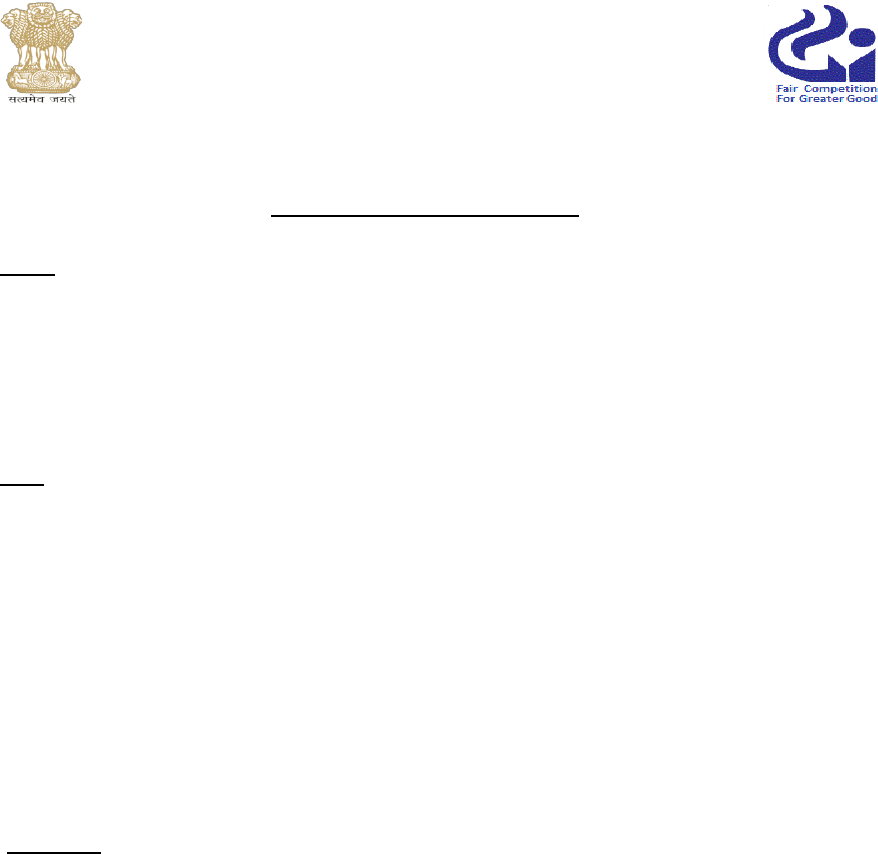
Ref. Case No. 02 of 2016 1
COMPETITION COMMISSION OF INDIA
Reference Case No. 02 of 2016
In Re:
Mr. Rizwanul Haq Khan
Dy. Chief Material Manager
Office of the Controller of Stores
Southern Railway
Informant
And
Mersen (India) Pvt. Ltd.
No. 5, Bommasandra Industrial Area
Bengaluru– 560 099
Opposite Party No. 1
Asssam Carbon Products Ltd.
No. 78, Victoria Road, Birkuchi
Chandrapur Road
Guwahati – 781 026
Opposite Party No. 2
CORAM
Mr. Ashok Kumar Gupta
Chairperson
Ms. Sangeeta Verma
Member
Mr. Bhagwant Singh Bishnoi
Member
Present:
For the Informant
:
Mr. S. Natrajan, Dy. Chief Materials Manager,
Southern Railway
For Opposite Party No. 1 and
its individuals
:
Mr. Vasanth Rajasekaran, Mr. Saurabh Babulkar,
Ms. Kripi Kathuria and Ms. Ritika Ganju,
Advocates
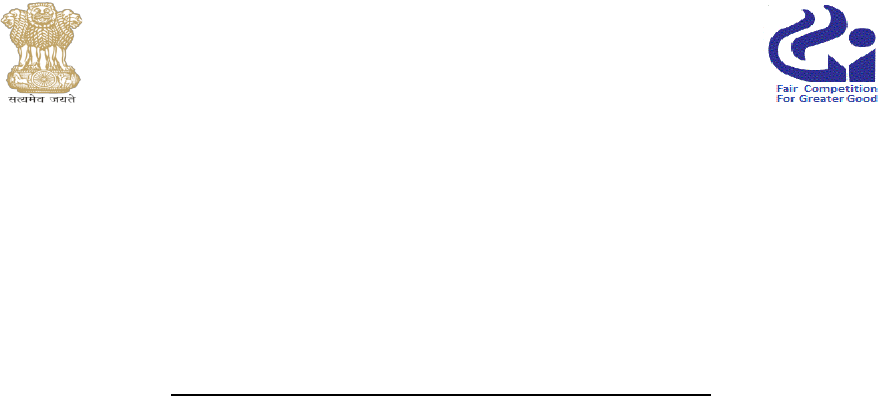
Ref. Case No. 02 of 2016 2
For Opposite Party No. 2 and
its individuals
:
Mr. Rajeev Sharma, Sr. Advocate with Mr.
Rishad A. Chowdhury, Ms. Priyanka Devgan and
Mr. Rajat Krishna, Advocates
Order under Section 27 of the Competition Act, 2002
1. The present Reference has been filed by Mr. Rizwanul Haq Khan, Deputy Chief
Materials Manager/Controller of Stores, Southern Railway (Informant), under Section
19(1)(b) against Mersen (India) Private Limited (Opposite Party No. 1/OP-1), and
Assam Carbon Products Limited (Opposite Party No. 2/OP-2), [collectively, ‘OPs’]
alleging inter alia contravention of the provisions of Sections 3 and 4 of the
Competition Act, 2002 (Act).
2. OP-1 is a subsidiary of multinational company viz. ‘Mersen SA’, France, which
operates in 35 countries through its subsidiaries/group companies with expertise in
electrical power. It is a leading company with expertise in manufacturing brushes and
brush holders for industrial electric motors.
3. OP-2 is an MSME and is inter alia engaged in supply of carbon brushes for Hitachi
Traction Motor Type HS 15250A, to Indian Railways.
4. It has been stated in the reference that Southern Railway has been procuring Carbon
Brushes for Hitachi Traction Motor Type HS 15250A from the OPs. The OPs are stated
to be the only two Research Designs and Standards Organisation (RDSO) approved
vendors of the said product in India, and the Informant has no other option but to
procure the said product from them.
5. It has been alleged that the OPs have been steadily hiking the rates of carbon brushes
for the last 5 years in tandem with each other without any justification. To support the
allegations, the Informant has enclosed a table containing the rates quoted by OPs
during 2010 to 2015. It has been thus alleged that the various tenders, as mentioned in
the reference, floated by the Informant for procurement of carbon brushes had been
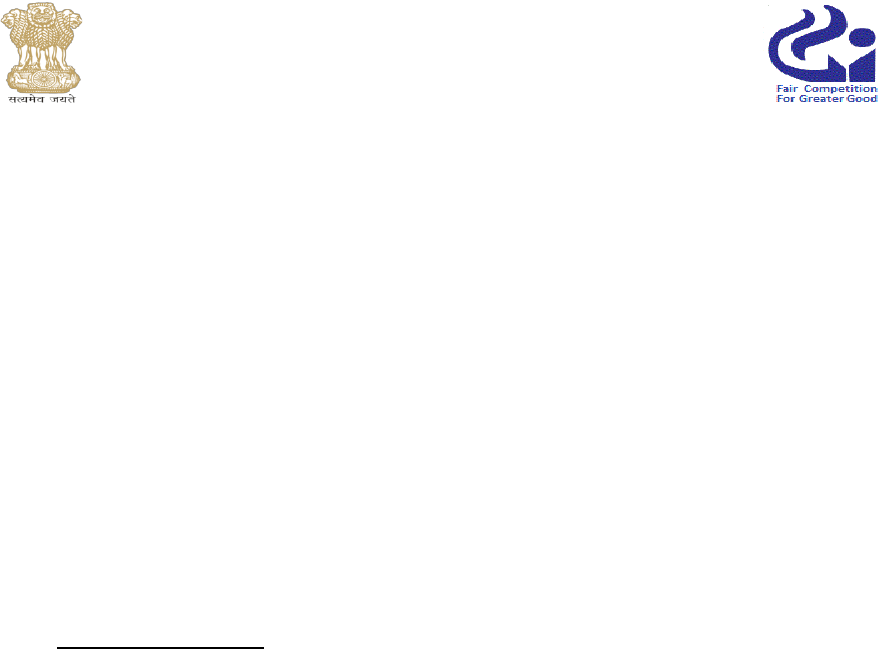
Ref. Case No. 02 of 2016 3
rigged by the OPs by way of cartelization and collusive bidding. Further, it was alleged
that OP-1 had hiked its quoted rate in the latest tender (2015) by more than 18%
compared to the purchase rate for the same grade in the previous year 2014, without
any justification or reason.
6. The Commission, after examining the reference and the material filed therewith, was
of prima facie view that their seemed to be a case of bid rigging in the tenders which
was noted as in contravention of the provisions of Section 3(3)(d) of the Act.
Accordingly, the Commission, vide its order dated 04.09.2017 passed under Section
26(1) of the Act, directed the Director General (DG) to cause an investigation into the
matter and file an investigation report.
Investigation by DG
7. Pursuant to the directions of the Commission issued under Section 26(1) of the Act,
the DG conducted investigation by issuing probe letters to the Informant, OPs and third
parties, who were also examined on oath based on the evidences gathered during
investigation.
8. During pendency of investigation, an application under Section 46 of the Act read with
Regulation 5 of the Competition Commission of India (Lesser Penalty) Regulations,
2009 (‘LPR’) was received in the Commission vide e-mail dated 05.07.2019 at 00:49
from OP-1 for grant of priority status under Regulation 5(2) of the LPR. Thereafter,
another application under Section 46 of the Act read with Regulation 5 of the LPR was
received in the Commission vide application dated 12.07.2019 at 03:45 PM from OP-
2 for grant of priority status under Regulation 5(2) of the LPR. The Commission vide
separate orders forwarded these leniency applications to the DG.
9. After completing investigation, the DG submitted the investigation report (non-
confidential version qua OPs), on 27.04.2021.
10. For examining the allegations against the OPs, the DG identified various issues. The
issues alongwith findings of the DG thereon, are noted below:

Ref. Case No. 02 of 2016 4
(i) Whether OPs are enterprises or persons under Section 3(1) of the Act?
It was concluded by the DG that as per the requirements of Section 3(1) of the
Act, OP-1 and OP-2 are enterprises as per the definition of ‘enterprise’ as given
in Section 2(h) of the Act.
(ii) If the answer to Issue No. (i) is in the affirmative, whether the OPs are engaged
in identical or similar trade of goods or provision of services?
It has been observed that OP-1 and OP-2 are engaged in manufacturing and
supplying of the carbon brushes in India. Carbon brushes supplied in relation to
tenders issued for Hitachi Traction Motor Type HS 15250A comprise both
Imported Grade and Indigenous Grade. It was pleaded by OP-1 in its submission
that, as the complaint of Informant is primarily about Carbon Brushes of
Imported Grade and OP-1, i.e., Mersen, did not supply Carbon Brush of Imported
Grade to Railways during 2015 and 2016, any allegation of cartelization is
outside the scope of investigation. When inquired of the Informant regarding the
status and distinction between Carbon Brush of Imported Grade and Indigenous
Grade, it replied that the Railways does not make any distinction between
Imported vis-a-vis Indigenous Grade in their tender documents.
The DG observed that both OPs are RDSO-approved suppliers for the Railways,
and the Railways procure these grades of Carbon Brushes interchangeably.
Therefore, the DG noted that it would be correct to suggest that OP-1 and OP-2
are both enterprises engaged in identical or similar trade of goods, i.e., Carbon
Brushes for Hitachi Traction Motor Type HS 15025A, as per Section 3(3) of the
Act.
Thus, the DG concluded that OP-1 and OP-2 are both enterprises engaged in
identical or similar trade of goods, i.e., Carbon Brushes for Hitachi Traction
Motor Type HS 15250A, as per Section 3 (3) of the Act.
(iii) If the answer to Issue No. (ii) is in the affirmative, whether the OPs entered into
any agreement that directly or indirectly resulted in bid rigging or collusive
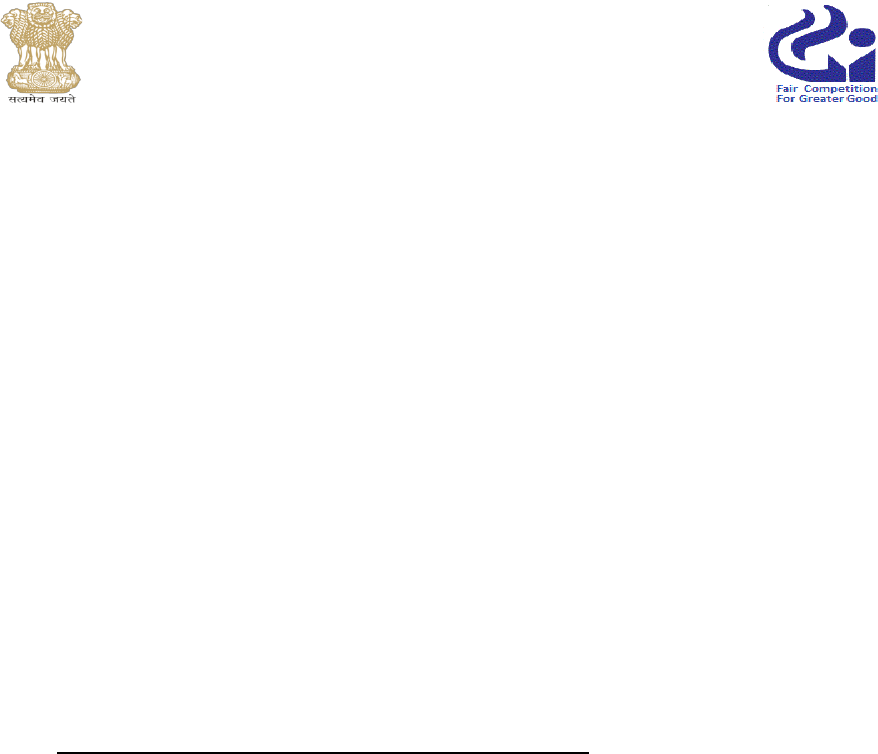
Ref. Case No. 02 of 2016 5
bidding in contravention of Section 3(3)(d) read with Section 3(1) of the Act.
Based on the evidences collected during the investigation such as WhatsApp
messages and e-mails exchanged between OPs, the DG concluded that OPs have
indulged in anti-competitive practices in contravention of the provisions of
Section 3(3)(d) of the Act read with Section 3(1) thereof, since 2015 onwards.
(iv) If the answer to Issue No. (iii) is in affirmative, who are the persons/office bearers
who were in charge of and responsible for the conduct of the business of OPs at
the time of the alleged contravention?
The DG has identified the following persons – Mr. V. I. Perumal, MD of OP-1,
and Mr. Rakesh Himatsingka, Director and Non-Executive Chairman of OP-2 –
as responsible for contravention committed by the OPs.
Consideration of the DG Report by the Commission
11. The Commission considered the investigation report in its ordinary meeting held on
12.05.2021 and vide an order of even date, decided to forward electronic copies of the
investigation report to the Parties for filing their respective objections/suggestions
thereto.
12. The Commission further directed the Opposite Parties to furnish their audited balance
sheets and profit & loss accounts/turnover for the financial years, i.e., 2009 – 10 to
2018 – 19. The Opposite Parties were further directed to file their respective details of
the revenue and profit generated from the sale of ‘Carbon Brushes’ during the aforesaid
financial years by way of Affidavit supported by certificates of Chartered Accountants.
13. Further, the Commission also directed to forward electronic copy of the investigation
report to the individuals of the OPs as identified by the DG, i.e., Mr. V. I. Perumal,
Managing Director of OP-1, and Mr. Rakesh Himatsingka, Director and Non-
Executive Chairman of OP-2, for the purposes of Section 48 of the Act, with directions
to file their respective objections/suggestions, and also directed them to furnish their
income details, including individual Income Tax Returns (ITRs), for the financial years
2016 – 17, 2017 – 18 and 2018 – 19.
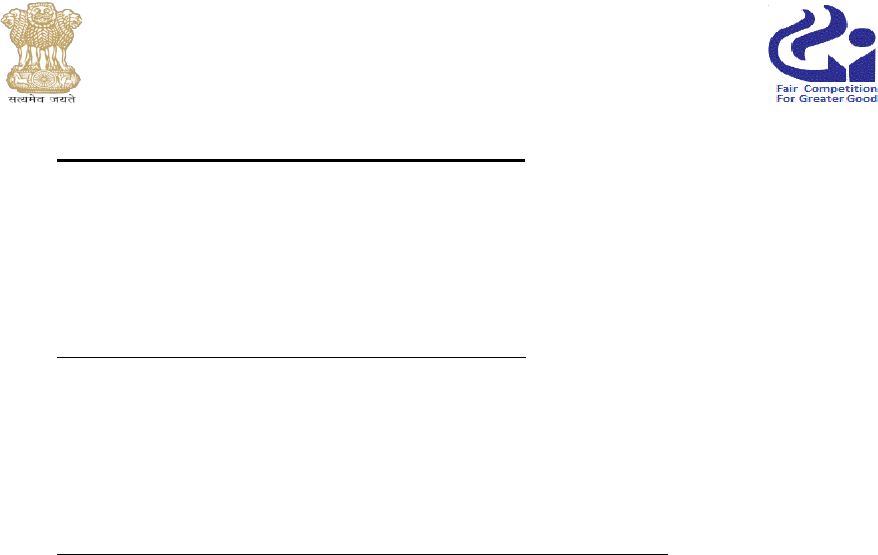
Ref. Case No. 02 of 2016 6
Replies/Objections/Submissions of the Parties
14. The Parties, except the Informant, filed their respective replies/objections/submissions
to the investigation report of the DG in addition to making oral submissions before the
Commission on 04.08.2021 when the matter was taken up for final hearing.
Replies/Objections/Submissions of the Informant:
15. The Informant has not filed any objections/suggestions to the investigation report.
However, a representative of the Informant appeared before the Commission during
final hearing and broadly supported the findings of the DG.
Replies/Objections/Submissions of OP-1 and Mr. V. I. Perumal:
16. OP-1 filed its objections/suggestions on 30.07.2021 to the investigation report of DG
and also filed written submissions on 07.08.2021 post-making oral arguments.
17. OP-1 stated that the DG had unilaterally expanded the scope of investigation despite
finding that there has been no contravention in relation to the impugned eight tenders
alleged by the Informant. However, the DG proceeded to investigate a new set of eight
railway tenders issued during the years 2016 – 2019 and also rendered its findings in
relation to the same without any prima facie opinion of Commission, thereby violating
the principles of natural justice.
18. OP-1 submitted that it had also made a leniency application wherein it provided
disclosures on the scope of its operations in connection to the tenders for the period
2010 – 2014. OP-1 further submitted that it has made bonafide, full, true, and vital
disclosures of all relevant material in its possession with respect to import grade
Hitachi Carbon Brushes for the period starting from 2010 to 2014.
19. OP-1 submitted that the market with respect to Hitachi Carbon Brushes is unilaterally
defined by the Railways, which decides its requirements and manner of procurement,
thereby creating entry barriers. Further, as a procurer, the Railways enjoy extensive
discretion and the presence of entry barriers on account of its procurement policies. It
was also contended that no Appreciable Adverse Effect on Competition (AAEC) was
caused.
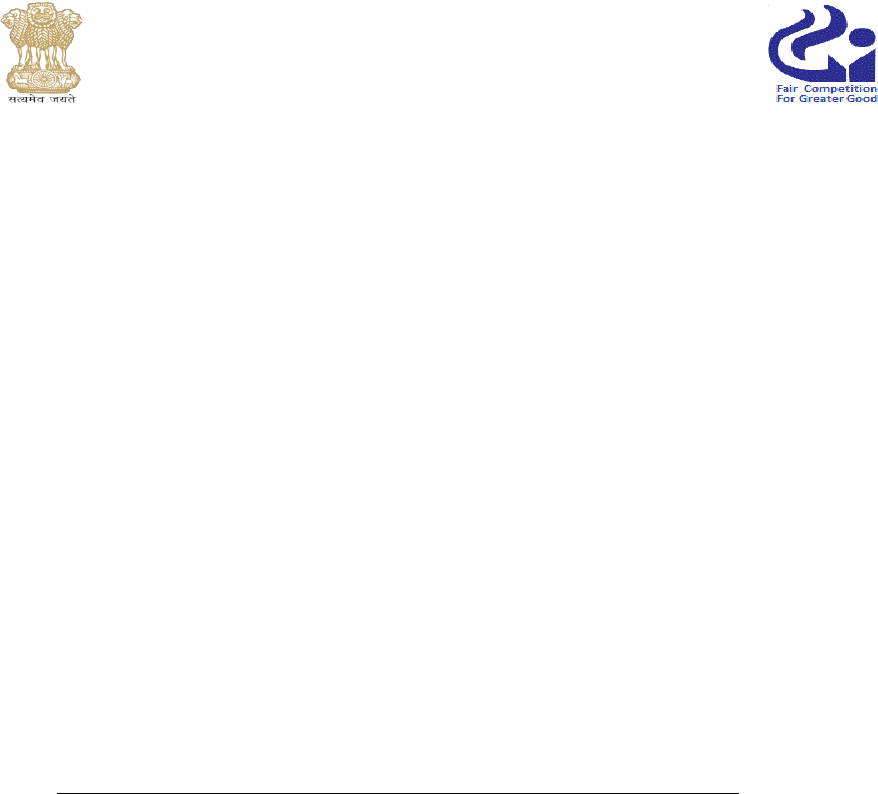
Ref. Case No. 02 of 2016 7
20. It was further contended that the DG’s findings based on e-mails, messages, and
WhatsApp chats are surmises and conjectures, and submitted that it was in discussion
with OP-2 with respect to the carbon brushes of Indigenous Grade only with the intent
of better understanding of market sentiments on its pricing.
21. OP-1 submitted that it has a good reputation and continuous support from
Railways/Research Design and Standard Organisation (RDSO) for more than four
decades, with an unblemished track record and antecedents.
22. Lastly, OP-1 submitted that, even though the discussions held earlier were limited to
the prevailing market conditions, factors affecting manufacture and supply of products,
and other such topics relating to business, it has been ensured that any further
conversation with OP-2 on any matter has been ceased. It has been submitted that
decrease in demand of Hitachi Carbon Brushes and adverse impact of the unpresented
COVID-19 pandemic affected OP-1 drastically.
Replies/Objections/Submissions of OP-2 and Mr. Rakesh Himatsingka:
23. It has been averred by OP-2 and its individual that they unequivocally and completely
agree and concur with the conclusions of the DG and admit to the role and findings
made against it in the investigation report of the DG. It has been submitted that OP-2
had co-operated with the DG during the investigation and added value to establish the
existence of cartel in the instant matter and made vital disclosures of OP-2 which were
the actual conclusions of the investigation report of the DG.
24. It has been further submitted that the primary objective of participating in the cartel
was to increase the existing prices of Hitachi Carbon Brushes to a level that would be
sustainable from a business perspective and try to secure orders for its manufacturing
unit, which was not being utilized to its appropriate extent for a long period of time.
25. It has been submitted that the Indian Railways have immense bargaining power to
pressurise suppliers to supply at lower prices and procure carbon brushes only from
RDSO-approved vendors. The market is highly concentrated, with the presence of
limited suppliers. It has been pointed out that tender conditions act as an entry barrier
to new suppliers and result in reduced competition.
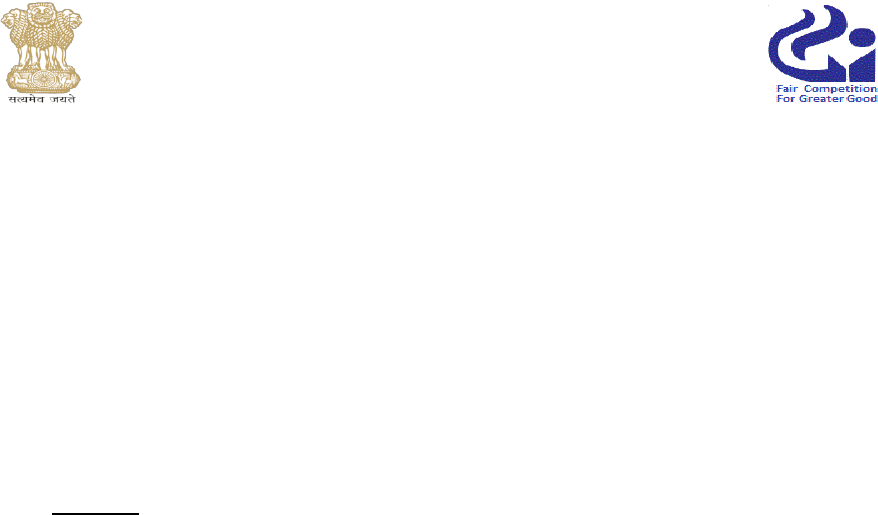
Ref. Case No. 02 of 2016 8
26. Lastly, it was pointed out that OP-2 has made leniency application explaining the
functioning of the cartel, revealed the role of the parties operating the cartel, reasons
for formulating the cartel, mode and manner for deciding prices to be quoted for
forthcoming tenders, and mode of deciding the winner of such forthcoming tenders,
and fully co-operated with the DG during the investigation. It has been submitted that
the evidence submitted by OP-2 completed the links to the investigation and provided
clinching evidence about the design of the cartel.
Analysis
27. The Commission has carefully perused the reference filed, the investigation report, and
evidences in support thereof submitted by the DG, the submissions made by the
Opposite Parties and the Informant, and the other material available on record and has
also heard in detail the arguments put forth by the Parties during oral hearings. On the
basis of the same, the Commission outlines the following two issues for consideration
and determination in the matter:
(i) Whether the Opposite Parties had acted in a manner in contravention of the
provisions of Section 3(3) of the Act in the tenders floated for procuring Hitachi
Carbon Brushes by collusive biding/bid rigging in terms of Section 3(3)(d) of
the Act.
(ii) In case the answer to the above issue is in the affirmative, who are the
individuals/persons/officials of the Opposite Parties who are liable in terms of
Section 48 of the Act?
28. Prior to analyzing the issues on merits, the Commission deems it appropriate to dispose
of a preliminary objection raised by the OP-1 with regard to the time period of the
cartel. In this regard, the Commission notes that the DG has divided the analysis into
two time periods: (a) 2010 till November 2014 and (b) after November 2014 till 2019.
The DG has examined the following e-mails in respect of the first time period, i.e.,
2010 till November 2014: (i) e-mail dated 20.12.2010 exchanged between Mr. Basak
and other employees of OP-1; (ii) e-mails dated 03.11.2011: three e-mails exchanged
between Mr. Krishna Kumar and Mr. Lokre, employees of OP-2; (iii) e-mails dated

Ref. Case No. 02 of 2016 9
29.07.2013: two emails exchanged between Mr. Krishna Kumar and Mr. Lokre,
employees of OP-2; (iv) e-mail dated 14.11.2014 exchanged between Mr. Rakesh
Himatsingka and Mr. K K Bhattacharya, employees of OP-2, and (v) e-mail dated
20.11.2014 exchanged between Mr. K. K. Bhattacharya and Mr. P. H. Krishnakumar,
employees of OP-2.
29. Based on the aforesaid internal communications amongst the OPs, the DG has
concluded that the investigation could not find any evidence which establishes that
there was any collusion between the OPs regarding the bids in Railway tenders during
the period 2010 to November 2014. However, with regard to the time period after
November 2014, the DG has concluded that OPs were indulging in anti-competitive
practices in contravention of Section 3 from the year 2015 onwards.
30. OP-1, however, as noted earlier, has raised an objection regarding the purported suo
motu investigation by the DG against the OPs for the time period after November 2014
till 2019, which were not specifically directed to be investigated in the prima facie
order of the Commission. It was argued that the DG ought to have sought the approval
of the Commission before proceeding with investigation for this period.
31. In this regard, at the outset, the Commission notes that while directing the DG to
investigate into the matter, it has not circumscribed the period for investigation. It is
neither feasible nor otherwise possible to order investigation into a specific time frame
with any exactitude as at the stage of forming prima facie administrative opinion based
on limited material, the Commission cannot predicate the extent of anti-competitive
conduct, the duration thereof and the parties involved. It is rather presumptuous to
delineate any perimeter for the purposes of investigation in cartel matters beforehand.
No infirmity can be attributed to such a course which is in comport with the various
judicial pronouncements, as detailed in the succeeding paras in this order.
32. The issue is no longer res integra and stands squarely covered by the decision of the
Hon’ble Supreme Court of India in the case of Excel Crop Care Limited v. Competition
Commission of India (2017) 8 SCC 47 which makes it abundantly clear that, while the
initial complaint may be on a limited aspect, the DG can investigate other violations
that emerged during the investigation of such a complaint. Further, one of the issues

Ref. Case No. 02 of 2016 10
that arose in this case was whether the DG was barred from investigating the matter
pertaining to the tender floated by the Food Corporation of India (FCI) in March 2011,
which obviously did not form part of the Information submitted by FCI made on
04.02.2011. In this regard, it was observed in paragraph 45 of the order to the following
effect as under:
“45. If the contention of the Appellants is accepted, it would render the
entire purpose of investigation nugatory. The entire purpose of such an
investigation is to cover all necessary facts and evidence in order to see as
to whether there are any anti- competitive practices adopted by the persons
complained against. For this purpose, no doubt, the starting point of
inquiry would be the allegations contained in the complaint. However,
while carrying out this investigation, if other facts also get revealed and
are brought to light, revealing that the 'persons' or 'enterprises' had
entered into an agreement that is prohibited by Section 3 which had
appreciable adverse effect on the competition, the DG would be well within
his powers to include those as well in his report. Even when the CCI forms
prima facie opinion on receipt of a complaint which is recorded in the
order passed Under Section 26(1) of the Act and directs the DG to conduct
the investigation, at the said initial stage, it cannot foresee and predict
whether any violation of the Act would be found upon investigation and
what would be the nature of the violation revealed through investigation.
If the investigation process is to be restricted in the manner projected by
the Appellants, it would defeat the very purpose of the Act which is to
prevent practices having appreciable adverse effect on the competition.
We, therefore, reject this argument of the Appellants as well touching upon
the jurisdiction of the DG.”
33. Further, the Hon’ble Supreme Court in the aforesaid case held that the language of the
order passed by the CCI was broad enough to enable the DG to look into “all the facts
till the investigation was completed”, and, thus concluded that the DG was not
prevented from examining any anti-competitive practice adopted by Excel Crop in the

Ref. Case No. 02 of 2016 11
2011 tender as well, which was not part of Section 26(1) order passed by the
Commission.
34. Further, in Cadila Healthcare Limited v. Competition Commission of India 2018 SSC
OnLine Del 11229, in dismissing Cadila’s Appeal, the Division Bench of the Hon’ble
Delhi High Court, after analyzing the decision in Competition Commission of India v.
Steel Authority of India Limited (2010) 10 SCC 744 and Excel Crop Care Limited v.
Competition Commission of India (supra), held as under:
"Cadila's argument, that in Excel Crop Care the issue was inclusion of
more than one instance or incident within the ambit of investigation (given
that the complaint was in respect of one tender only) is distinguishable, is
in this court's opinion, insubstantial and needs to be rejected. Its reliance
on Grasim Industries, is no longer apt. At the stage when the CCI takes
cognizance of information, based on a complaint, and requires
investigation, it does not necessarily have complete information or facts
relating to the pattern of behaviour that infects the marketplace. Its only
window is the information given to it. Based on it, the DG is asked to look
into the matter. During the course of that inquiry, based on that solitary
complaint or information, facts leading to pervasive practises that amount
to abuse of dominant position on the part of one or more individuals or
entities might unfold. At this stage, the investigation is quasi inquisitorial,
to the extent that the report given is inconclusive of the rights of the parties;
however, to the extent that evidence is gathered, the material can be final.
Neither is the DG's power limited by a remand or restricted to the matters
that fall within the complaint and nothing else. Or else, the Excel Crop
Care would not have explained the DG's powers in broad terms: (if other
facts also get revealed and are brought to light, revealing that the 'persons'
or 'enterprises' had entered into an agreement that is prohibited by Section
3 which had appreciable adverse effect on the competition, the DG would
be well within his powers to include those as well in his report....If the
investigation process is to be restricted in the manner projected by the
Appellants, it would defeat the very purpose of the Act which is to prevent

Ref. Case No. 02 of 2016 12
practices having appreciable adverse effect on the competition). The
trigger for assumption of jurisdiction of the CCI is receipt of complaint or
information, (when the Commission is of the opinion that there exists a
prima facie case exists (per Section 26 (1)). The succeeding order is
administrative (per SAIL); however, that order should disclose application
of mind and should be reasoned (per SAIL). Up to this stage, with that
enunciation of law, no doubt arguably Cadila could have said that absent
a specific order as regards its role, by CCI, the DG could not have inquired
into its conduct. However, with Excel Crop Care specifically dealing with
the question of alleged "subject matter" expansion (in the absence of any
specific order under Section 26(1)) and the Supreme Court clarifying that
the subject matter included not only the one alleged, but other allied and
unremunerated ones, involving others (i.e. third parties), the issue is no
longer untouched; Cadila, in the opinion of this court, is precluded from
stating that a specific order authorizing transactions by it, was a necessary
condition for DG's inquiry into its conduct. This court is further reinforced
in its conclusion in this regard by the express terms of the statute: Section
26 (1) talks of action by CCI directing the DG to inquire into "the matter".
At this stage, there is no individual; the scope of inquiry is the tendency of
market behaviour, of the kind frowned upon in Sections 3 and 4. The stage
at which it CCI can call upon parties to react is when it receives a report
from DG stating there is no material calling for action, it has to issue
notice to the concerned parties (i.e. the complainant) before it proceeds to
close the case (Sections 26 (5) and (6)). On the other hand, if the DG's
report recommends otherwise, it is obliged to proceed and investigate
further (Sections 26 (7) and (8)). Again Section 27 talks of different
"parties" [enterprise or association of enterprises or person or association
of persons‖- per Section 27 (a)]. Likewise, the steps outlined in Section
26 are amplified in the procedure mandated by Regulation 20 and 21,
which requires participation by "the parties" in the event a report after
DG's inquiry, which is likely to result in an adverse order, under Sections
27-34 of the Act. Consequently, Cadila's argument that a specific order by

Ref. Case No. 02 of 2016 13
CCI applying its mind into the role played by it was essential before the
DG could have proceeded with the inquiry, is rejected." (emphasis Added)
35. It needs no reiteration that proceedings before the Commission are inquisitorial in
nature and the remedies issued are in rem. In this statutory scheme and considering the
dicta laid down by the constitutional courts, it is axiomatic that the DG need not be
restricted to or hidebound by the specific facts or specific parties or time period stated
in the Information/ Reference or the prima facie directions of the Commission.
36. In view of the above, no fault can be found with the DG investigating the conduct of
the OPs for the time period after November 2014 till 2019 in respect of other tenders.
The contention of OP-1 that the DG has expanded the scope of investigation is
accordingly rejected.
37. Having disposed of the preliminary jurisdictional issue, the Commission proceeds to
examine the matter on merits. In this regard, it is observed that the DG did not find
evidence of cartelization in respect of the period between 2010 to 2014 and
accordingly, the Commission proceeds to examine the conduct and the evidence
collected by the DG in respect of the period post November 2014 till 2019 to ascertain
as to whether the same fall foul of the provisions of the Act.
38. The instant Reference emanates out of the allegations made by the Informant against
the OPs alleging bid rigging in the various tenders floated by Indian Railways for
procurement of carbon brushes. It was alleged in the Reference that in the tenders
floated by the Informant, OP-1 and OP-2 have rigged the bids in the impugned tenders.
However, as noted, the investigation could not find conclusive evidence to suggest that
OP-1 and OP-2 rigged the tendering process during the period up to November 2014.
The DG, however, found evidence against OPs for the period post November 2014 till
2019.
39. To begin with, the Commission notes that OP-2 has not disputed any findings made by
the DG in the investigation report and during the oral hearing also, reiterated that it had
co-operated with the DG during the investigation and made vital disclosures which
were the actual conclusions of the investigation report of the DG. In this backdrop, the

Ref. Case No. 02 of 2016 14
Commission finds it appropriate to analyse the evidence collected during investigation
by the DG against OP-1 and OP-2 and their respective individuals identified under
Section 48 of the Act.
40. The Commission observes that OPs are two RDSO-certified sources for manufacturing
and supplying carbon brushes for Hitachi Traction Motor Type HS 15250A. Carbon
brush is one of the components used in the Hitachi Traction Motor Type HS 15250A,
which acts as an electrical contact, conducts current between stationary wires and
moving parts, most commonly in a rotating shaft of the traction motor. Brushes provide
connection between rotating parts and external circuitry, and plays a major role in
satisfactory commutation of DC machines. Hitachi Traction Motor Type HS 15250A
was specially developed by Hitachi for the Indian Railways and used for the propulsion
of locomotives or electric roadway vehicles and is an equipment used in an electric
locomotive.
41. At this stage, it would be appropriate to consider the submissions of OP-1 that it was
in discussions with OP-2 with respect to the Hitachi Carbon Brushes of Indigenous
Grade whereas the instant reference is primarily about Carbon Brushes of Imported
Grade. In this regard, the Commission notes that OP-1 had previously raised this issue
of distinction between Imported Grade and Indigenous Grade before the DG also.
During investigation, when the DG sought a clarification from the Informant about the
status and distinction of Hitachi Carbon Brushes of Imported Grade and Indigenous
Grade, the Informant replied that the Railways does not make any distinction of
Imported Grade vis-a-vis Indigenous Grade in their tender documents. This remains
unrebutted.
42. Further, the Commission observes that the Informant, vide a letter dated 04.03.2020,
clarified that the description of Hitachi Carbon Brushes does not specifically mention
as to whether the supply should be Indigenous/Imported. It has been stated that Hitachi
Carbon Brushes have to be purchased from RDSO-approved sources only for the
following three grades: EG105(S) (Imported & Indigenous Grade) of OP-2; EG9049
(Imported Grade) and EG8220 (Indigenous Grade) of OP-1. Moreover, OP-1 has
neither refuted the aforesaid contention of the Informant nor placed any record to show

Ref. Case No. 02 of 2016 15
that there exists a distinction between Imported Grade and Indigenous Grade Hitachi
Carbon Brushes.
43. Now, the Commission proceeds to examine as to whether there was an agreement
between the OPs to rig the bids in respect of the tenders floated by the Railways for
procurement of Hitachi Carbon Brushes.
44. Before examining this issue, it is apposite to note that the definition of ‘agreement’ as
given in Section 2(b) of the Act requires, inter alia, any arrangement or understanding
or action in concert whether or not formal or in writing or intended to be enforceable
by legal proceedings. The definition, being inclusive and not exhaustive, is a wide one.
An understanding may be tacit and the definition under Section 2(b) of the Act covers
even those situations where parties act on the basis of a nod or a wink. The Commission
notes that the Act envisages civil liability. Thus, the standard of proof required to prove
an understanding or an agreement would be on the basis of ‘preponderance of
probabilities’ and not ‘beyond reasonable doubt’. There is rarely any direct evidence
of action in concert and in such situations, the Commission has to determine whether
those involved in such dealings had some form of understanding and were acting in
cooperation with each other. In light of the definition of the term ‘agreement’, the
Commission has to assess the evidence on the basis of benchmark of preponderance of
probabilities.
45. Further, in terms of the provisions contained in Section 3(1) of the Act, no enterprise
or association of enterprises or person or association of persons can enter into any
agreement in respect of production, supply, distribution, storage, acquisition or control
of goods or provision of services, which causes or is likely to cause an appreciable
adverse effect on competition within India. Section 3(2) of the Act declares that any
agreement entered into in contravention of the provisions contained in sub-section (1)
shall be void. Further, by virtue of the presumption contained in sub-section (3), any
agreement entered into between enterprises or associations of enterprises or persons or
associations of persons or between any person and enterprise or practice carried on, or
decision taken by, any association of enterprises or association of persons, including
cartels, engaged in identical or similar trade of goods or provision of services, which-
(a) directly or indirectly determines purchase or sale prices; (b) limits or controls
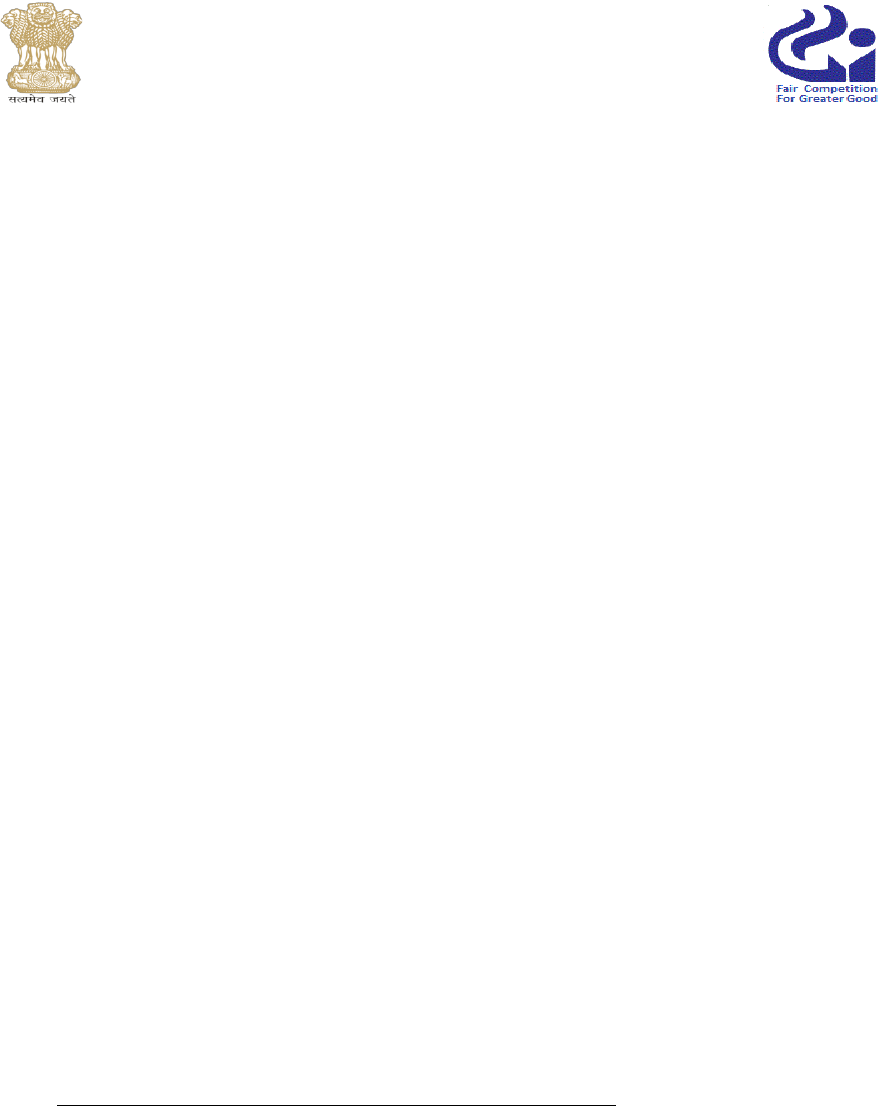
Ref. Case No. 02 of 2016 16
production, supply, markets, technical development, investment or provision of
services; (c) shares the market or source of production or provision of services by way
of allocation of geographical area of market, or type of goods or services, or number
of customers in the market or any other similar way; or (d) directly or indirectly results
in bid rigging or collusive bidding, shall be presumed to have an appreciable adverse
effect on competition.
46. As per the explanation appended to Sub-Section (3) of Section 3 of the Act, “bid
rigging” means any agreement, between enterprises or persons referred to in Sub-
Section (3) engaged in identical or similar production or trading of goods or provision
of services which has the effect of eliminating or reducing competition for bids or
adversely affecting or manipulating the process for bidding.
47. In case of agreements as listed in Section 3(3)(a) to (d) of the Act, once it is established
that such an agreement exists, it will be presumed that the agreement has an appreciable
adverse effect on competition; the onus to rebut the presumption would lie upon the
parties.
48. In the aforesaid statuary backdrop, the Commission proceeds to examine the evidence
collected by the DG to assess whether there was an “agreement” between the OPs of
the nature which is prohibited in terms of the provisions contain in Section 3(1) of the
Act read with Section 3(3)(d) thereof.
WhatsApp Messages Exchanged Between OP-1 and OP-2
49. During the course of investigation, certain exchange of communication between Mr.
V. I. Perumal, Managing Director (MD) of OP-1, and Mr. Rakesh Himatsingka,
Chairman of OP-2, through WhatsApp were collected and analysed by the DG. The
relevant WhatsApp chats were from 01.07.2016 till 08.11.2018. In the said chats, Mr.
V. I. Perumal (OP-1) is often referred as ‘Perumal’ and Mr. Rakesh Himatsingka of
OP-2 is often referred as ‘RH’ indicating the abbreviated form of their names
respectively. It is further mentioned that, though the relevant product is Carbon Brushes
for Hitachi Traction Motor Type HS 15250A, OPs, in their communications referred
to them as ‘tender for Brushes’ or ‘Hitachi’ tenders.
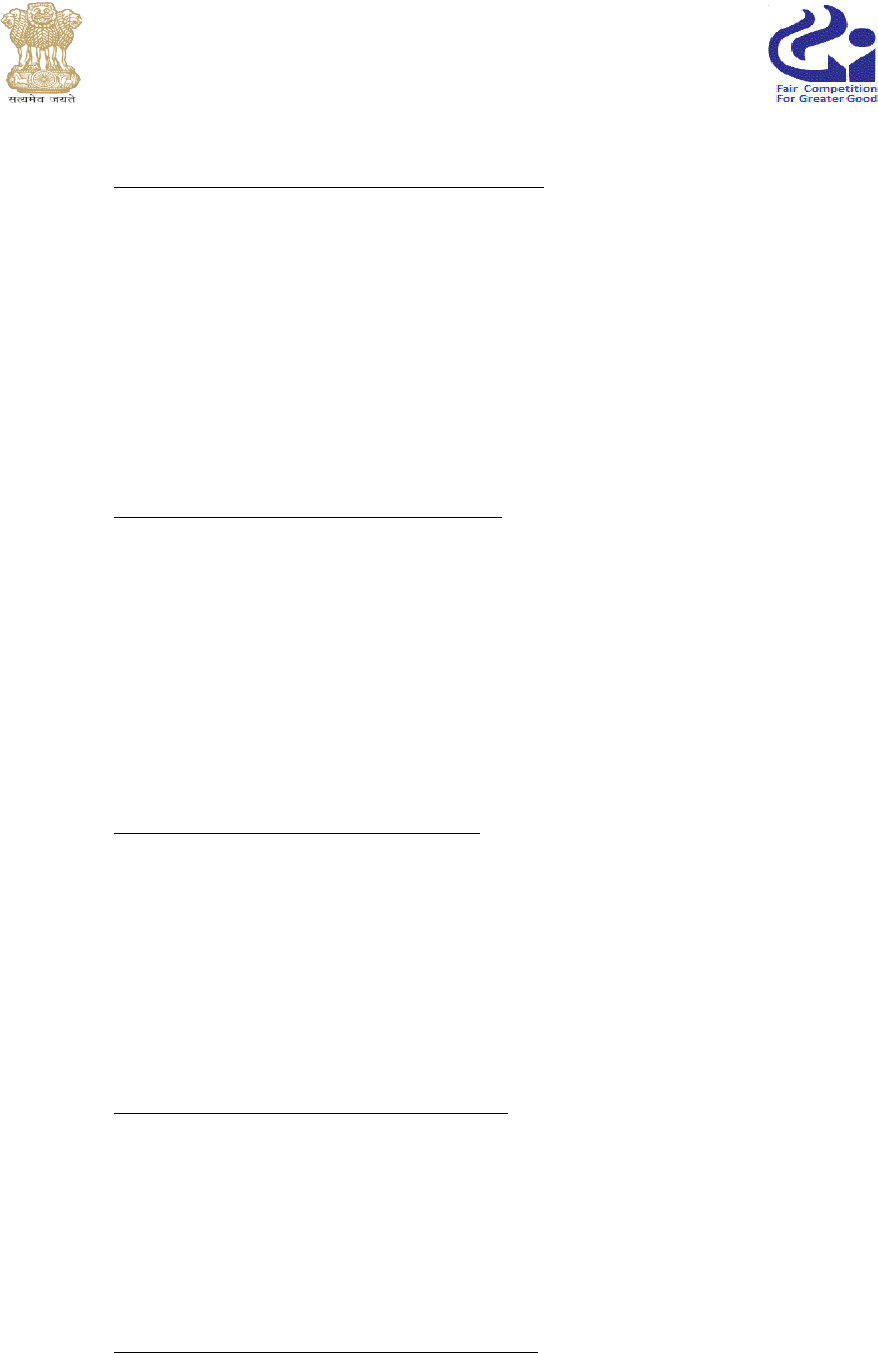
Ref. Case No. 02 of 2016 17
Message exchanged on 01 .07.2016 by OP-2
Dear Mr. Perumal. A quick message. Please whatsapp me as to what was
our final understanding as regards the present DMW tender, especially
which are the items where we wrongly quoted as a result of which we
became L2. I'm presently in South Africa n very difficult to connect. Tried
to call u earlier but ur no, was no reply. Thanks n Regards. RH.
Message replied on 01.07.2016 by OP-1
Dear Mr. Himatsingka, what value we got excess, we allow you to take in
hitachi and 253 BX. When u r back, we can share the numbers. Regards,
Perumal
Sorry, what excess we get, as we still not got.
Message sent on 01 .07.2016 by OP-2
Dear Mr. Perumal, I don't think I was able to clarify to you. What I'm
talking about is the tender from DMW, Patiala for which you'd recall that
our guys quoted wrongly. What was our final understanding for that,
Thanks RH
Message replied on 01 .07.2016 by OP-1
Dear Mr Himatsingka, I am talking about same. Let us talk when you are
back.
Regards, Perumal
Message exchanged on 28.03.2017 by OP-2
Hello Mr. Perumal, it's been ages since we corresponded or met. Expect
alls well at your end.
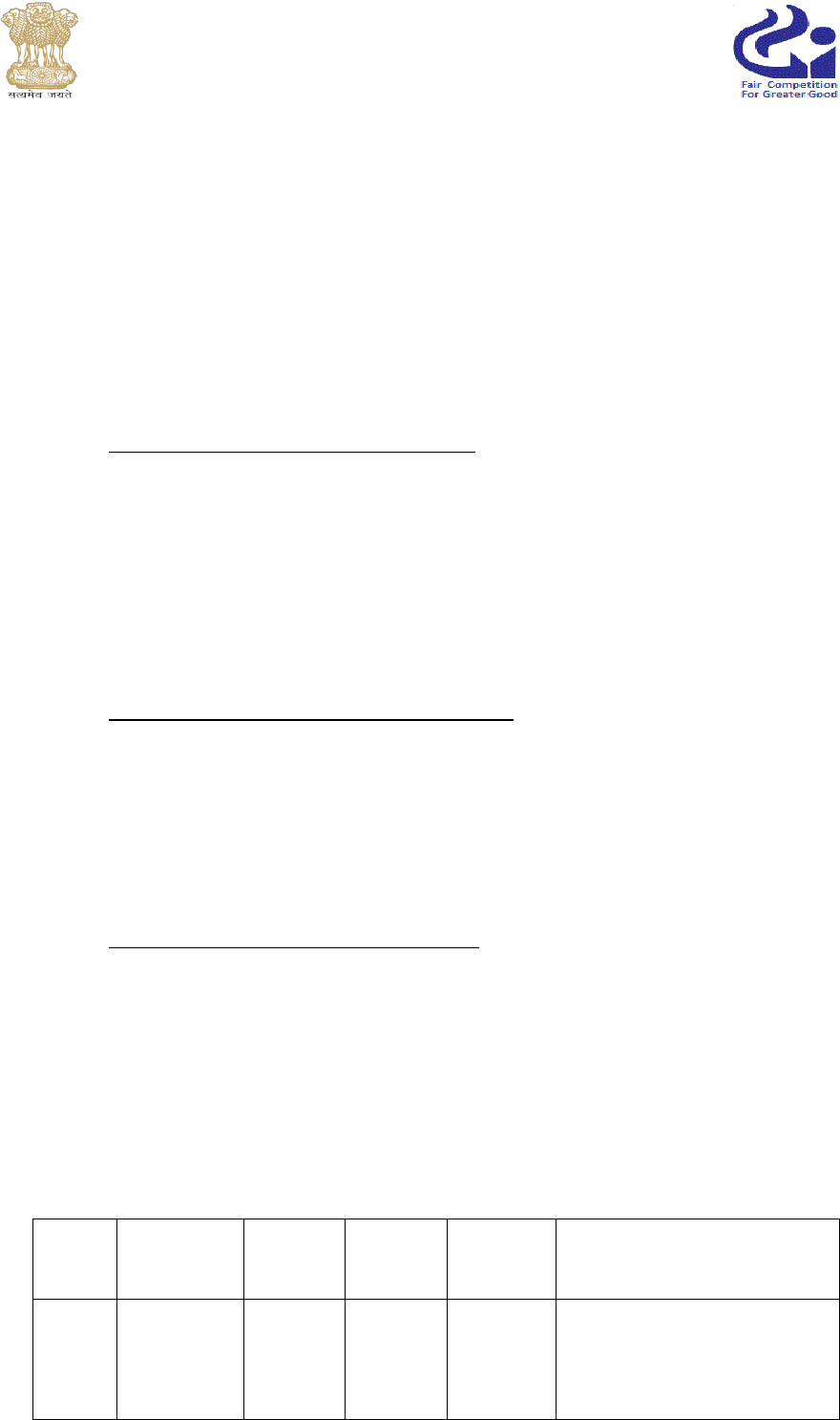
Ref. Case No. 02 of 2016 18
As you'd have observed for the last Hitachi tender last week we quoted 2
prices, one for 17-18 n the other for 18 -19, whereas you quoted just one
price?
Trow is tender for 55121 Hitachi. What do you propose. We are very short
n wud like this.
Message replied on 29.03.2017 by OP-I
Dear Mr. Himatsinka, sorry for late response. We are having a holiday in
Bangalore to day. Our Marketing Manager is not in India. We quoted
similar to earlier for this tender. Will revert to you before next tender.
Regards, Perumal.
Message exchanged on 23.04.2018 by OP-2
You may be aware that DMW has called us for negotiations tomorrow
24th.Their proposal is to accept last year’s price, in which case they shall
divide the Tender 50: 50. We are ok with this. Await your confirmation n
Message replied on 23.04.2018 by OP-1
It is okay. We agree to maintain last tender prices
50. Further, the Commission notes that the details of the discussion regarding the various
tenders for the Carbon Brushes have been unearthed by the DG, and the same is
reproduced below:
S. No
Tender
Date
Price by
OP -1
Price by
OP-2
WhatsApp
1.
40161138
27.07.16
331
332
"You can take NCR and
EGOR at Rs. 321 and we
Taje Rs 320 for WCR"
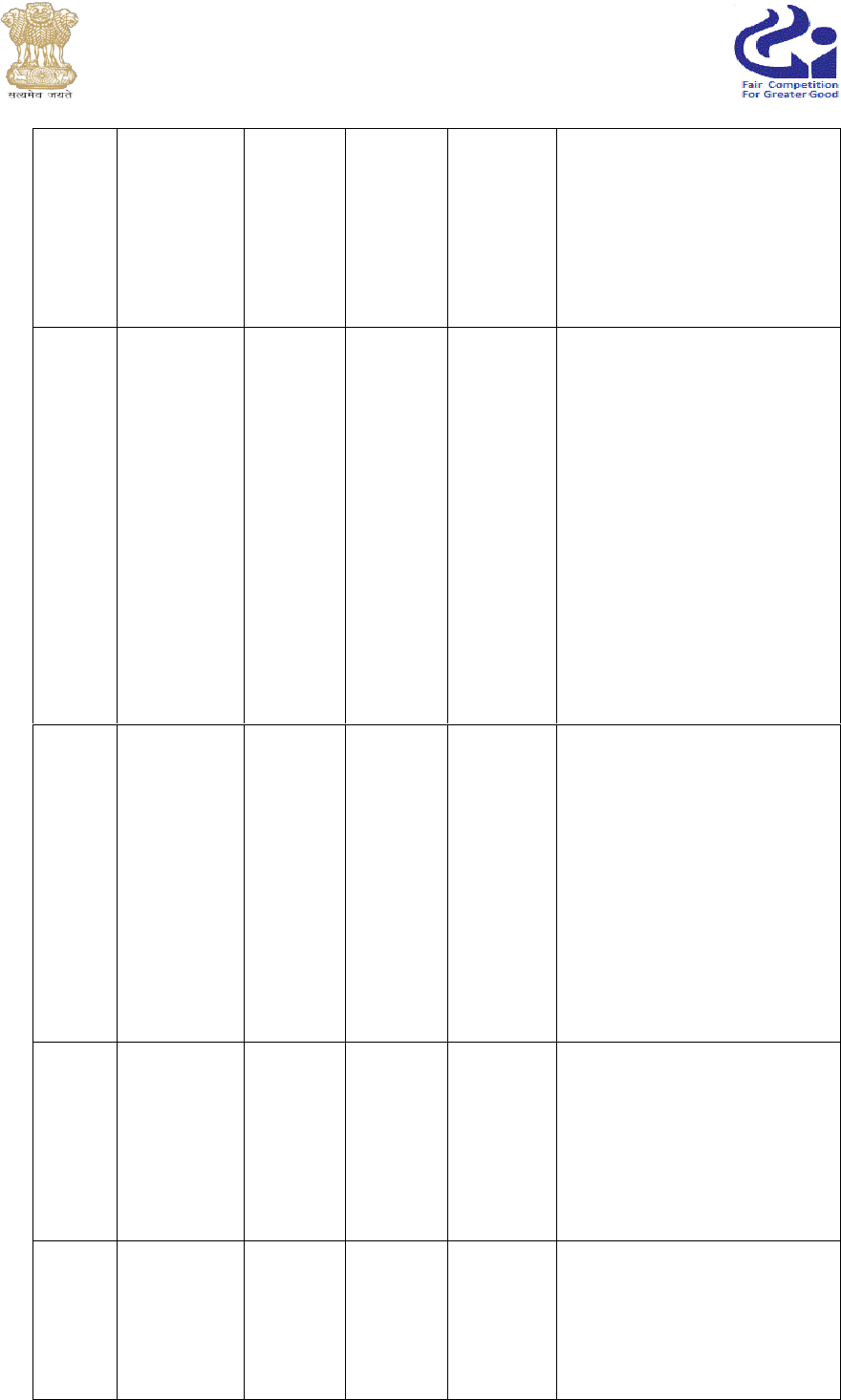
Ref. Case No. 02 of 2016 19
2.
40162502
02.08.16
319.4
326
WhatsApp: "No problem.
Last u had mentioned that we
should stay at 321 n u wud
quote 318.
Now we shall quote 326"
3.
2161391
22.08.16
303
299
WhatsApp: "Hello Mr.
Perumal, Greetings from
China. As you'd be aware
t'row is EGOR tender for
2743 7 Hitachi. We'd like
this n propose to quote 2991-
for this year's supply n 321
for next year's. Hope this is
ok with you.
Rgds."
4.
25161282
26.09.16
0
321
WhatsApp: "Now that Rs.
321 price is 7 known thorugh
previous tenders, we will
quote a price to be equal to
your final price, (including
taxes) and try for split. You
may quote Rs.321. Regards,
perumal
5.
6163456
29.03.17
320.47
321
WhatsApp:
"T'row is tender for Hitachi.
What do you propose.
We are very short n wud like
this"
6.
25164582
06.04.17
333
321
WhatsApp: "Today's tender
at SCR, we will quote high at
Rs 333. U can quote lower
than us.

Ref. Case No. 02 of 2016 20
Regards, Perumal
7.
06173456
11.12.17
321
321
WhatsApp:
"This msg is in respect of
Hitachi w RIy tender for
72,165 nos. This year we are
short on orders. Already we
are over Rs.90 Lakhs behind
you and so we'd like this full
quantity and need your
support."
8.
25181261A
08.11.18
346
348
WhatsApp:
"Dear Mr. Himatzingkta,
hitachi
tender about 43 K is due on
81h Nov. we propose to
quote Rs.346.;-, You can
quote+/- Rs 2.
Regards Perumal
51. The Commission observes that the relevant WhatsApp chats are from 01.07.2016 till
08.11.2018, and the analysis of the above exchanges between Managing Director of
the OP-1 and Chairman of OP-2 since July 2016 leaves no scope for doubt that there
is a clear exchange of thoughts and ‘meeting of minds’ to the extent of entering into an
understanding and agreement between the two regarding the prices to be quoted and
discussion regarding an increase in price before filing of bids across different tenders
floated by the various Divisions of Indian Railways. This clearly exhibits the
manipulation of the process of bidding and eliminating the process of competitive
pricing by quoting prices and distribution of tenders among them.
E-mails Exchanged Between OP-1 and OP-2
52. The Commission further observes that, in addition to the above evidence displaying
the exchange of communication between the OPs through WhatsApp, the DG also
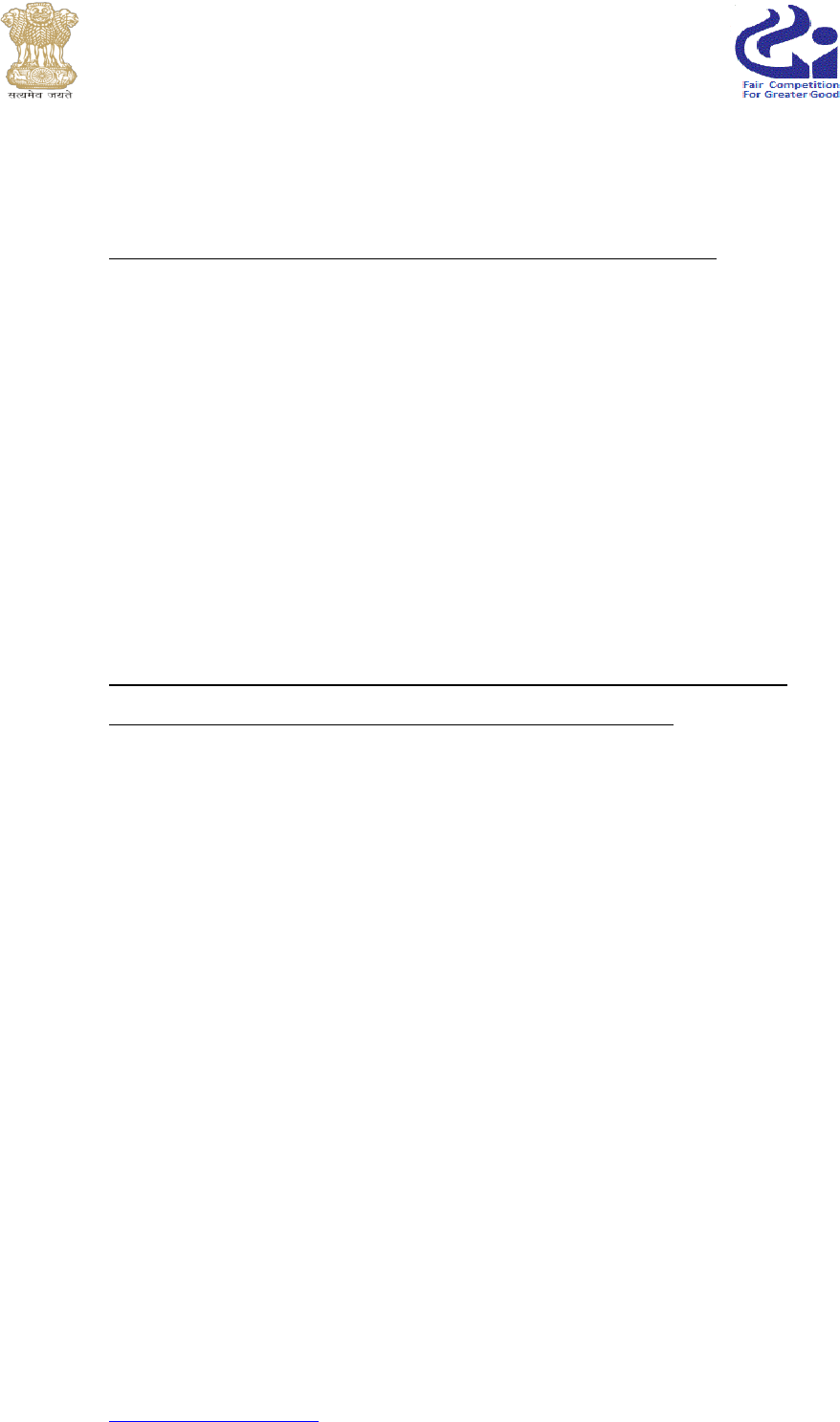
Ref. Case No. 02 of 2016 21
found e-mails exchanged between OP-1 and OP-2. The relevant excerpts of e-mails
are reproduced below:
Email dated 10.05.2017 from Rakesh Himatsingka to V I Perumal
“Subject: Fwd: Proposal DMW Tender No 011820420 Due 23.05.2017
(10.05.201 7).xlsx
Dear Mr. Perumal,
As discussed please find attached the proposed distribution. As regards CB
21 RF, where we have proposed to be L I this year. We shall offer only 60
% of the quantity, so there is no confusion.
Regards, RH."
Email dated 11.05.2017 from V I Perumal (vipe[email protected]) —MD
of Mersen (OP-1) to Rakesh Himatsingka, Chairman of OP-2
"Just to avoid any confusion, We will follow prices mentioned in "option"
sheet, will be followed. You should get Rs, 4.27 Cr and we get Rs. 4.20 Cos.
Modified prices are based on your proposal, and we get about Rs.50 lacs
less. Please confirm."
On 11 May 2017, at 15:17, V I Perumal <[email protected]> wrote:
Just to avoid any confusion we will follow prices mentioned in “option”
sheet, will be followed. You should get Rs. 4.27 Cr. And we get Rs. 4.20
Cos.
Modified prices are based on your proposal, and we get about Rs. 50 lacs
less. Please confirm.
V I perumal

Ref. Case No. 02 of 2016 22
Email dated 11.05.2017 from Rakesh Himatsingka to V I Perumal
(viperumaIymail.com)
"I'm on board the flight. Shall look at the Options sheet and revert back
tomorrow or within a day or two, as we have sufficient time.
Regards,
RH"
From: Rakesh Himatsingka
Date 11 May 2017 at 19:04:07 GMT+5:30
To: V I PERUMAL <[email protected]>
Subject: Re:work sheet
I’m on board the flight. Shall look at the options Sheet and revert back
tomorrow or within a day or two, as we have sufficient time.
Regards,
RH.”
53. A bare perusal of the above e-mails exchanged between OP-1 and OP-2, clearly
indicates that both OPs discussed amongst themselves prospective bid prices to enable
either the sharing of tenders between them based on split provisions or rotation of bids
among themselves.
54. Moreover, vide a response dated 02.12.2020 before the DG, OP-1 had admitted that he
had been communicating with OP-2. The relevant excerpt is reproduced below:
“(ii) Have you ever communicated by way of emails / WhatsApp/
Messages/ calls with any person of M/s Assam Carbon Pvt. Ltd. in regard
to the railway tenders for Hitachi Carbon Brushes/ if yes, have you ever
discussed prices to be quoted in the tender bids? If Yes, since when?
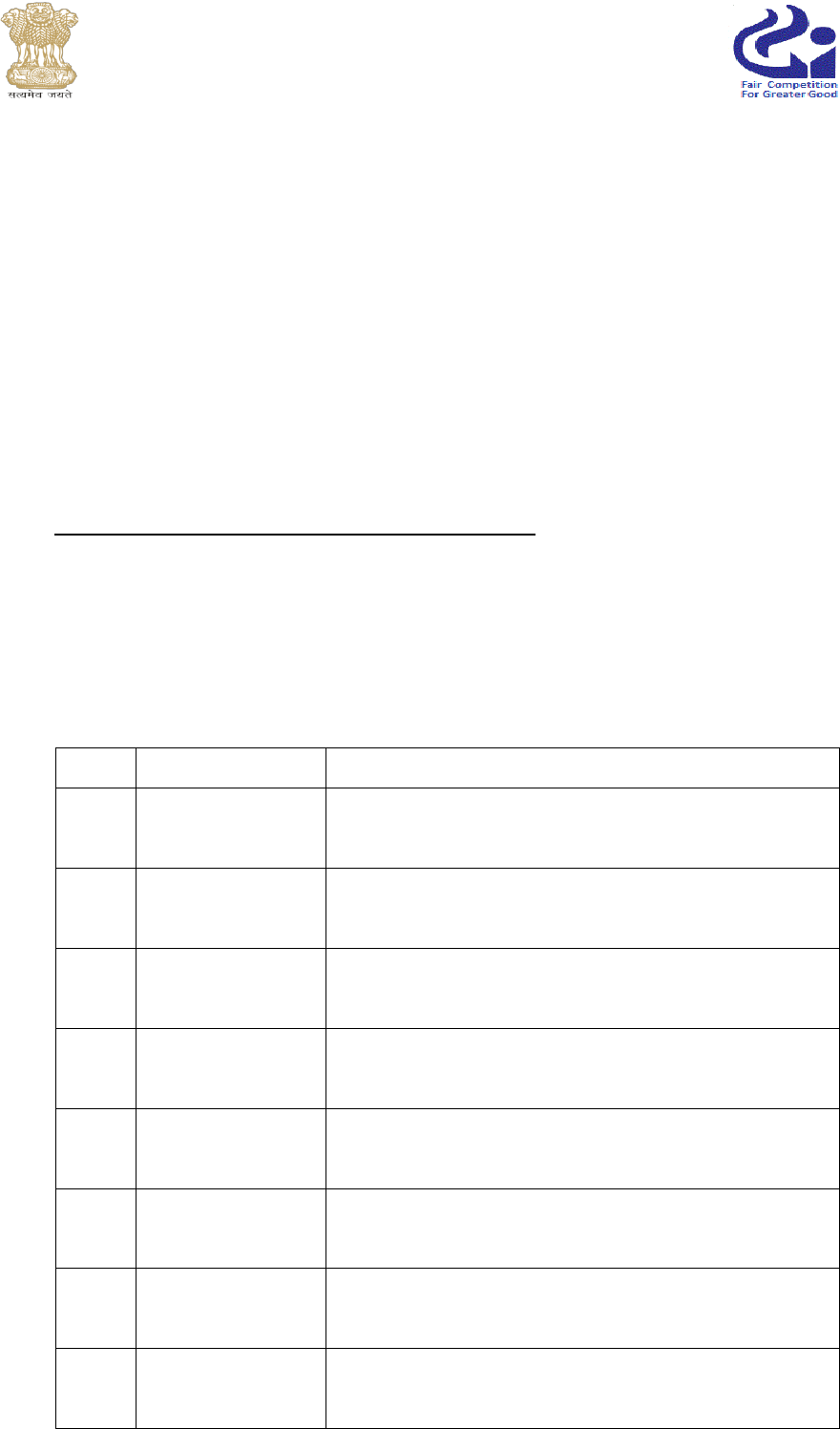
Ref. Case No. 02 of 2016 23
Ans.…
However, there has been communication by way of whatsapp between me
and Mr Rakesh Himatsingka of ACPL during the period between 2016 and
2018 on pricing for certain Railway tenders for supply of Hitachi Carbon
Brushes …”
55. Based on the above, the Commission notes that there is clear admission by OP-1 in its
submission dated 02.12.2020 that it was communicating regarding prices with OP-2
with respect to the product in question.
E-mails Exchanged Between the employees of OP-2
56. Additionally, the Commission notes that there was an exchange between Mr. Rakesh
Himatsingka, Chairman of OP-2, and Mr. Jayant Kumar of OP-2, wherein there is a
clear conversation regarding the options and plans for quoting in the tender bids. The
DG examined various e-mails which are as follows:
S. No.
Date
E-mail
1.
25.06.2015
e-mails between Mr. Jayant Kumar and Mr. Rakesh
Himatsingka
2.
27.10.2015
Four e-mails between Mr. Rakesh Himatsingka and
Mr. Jayant Kumar
3.
20.10.2016
An e-mail between Mr. Jayant Kumar and Mr. Rakesh
Himatsingka
4.
21.10.2016
An e-mail between Mr. Rakesh Himatsingka and Mr.
Jayant Kumar
5.
05.12.2016 &
06.12.2016
e-mails between Mr. Jayant Kumar and Mr. Rakesh
Himatsingka
6.
27.03.2017
An e-mail between Mr. Jayant Kumar and Mr. Rakesh
Himatsingka
7.
12.05.2017
Two e-mails between Mr. Rakesh Himatsingka and
Mr. Jayant Kumar
8.
17.05.2017
An e-mail between Mr. Jayant Kumar and Mr. Rakesh
Himatsingka
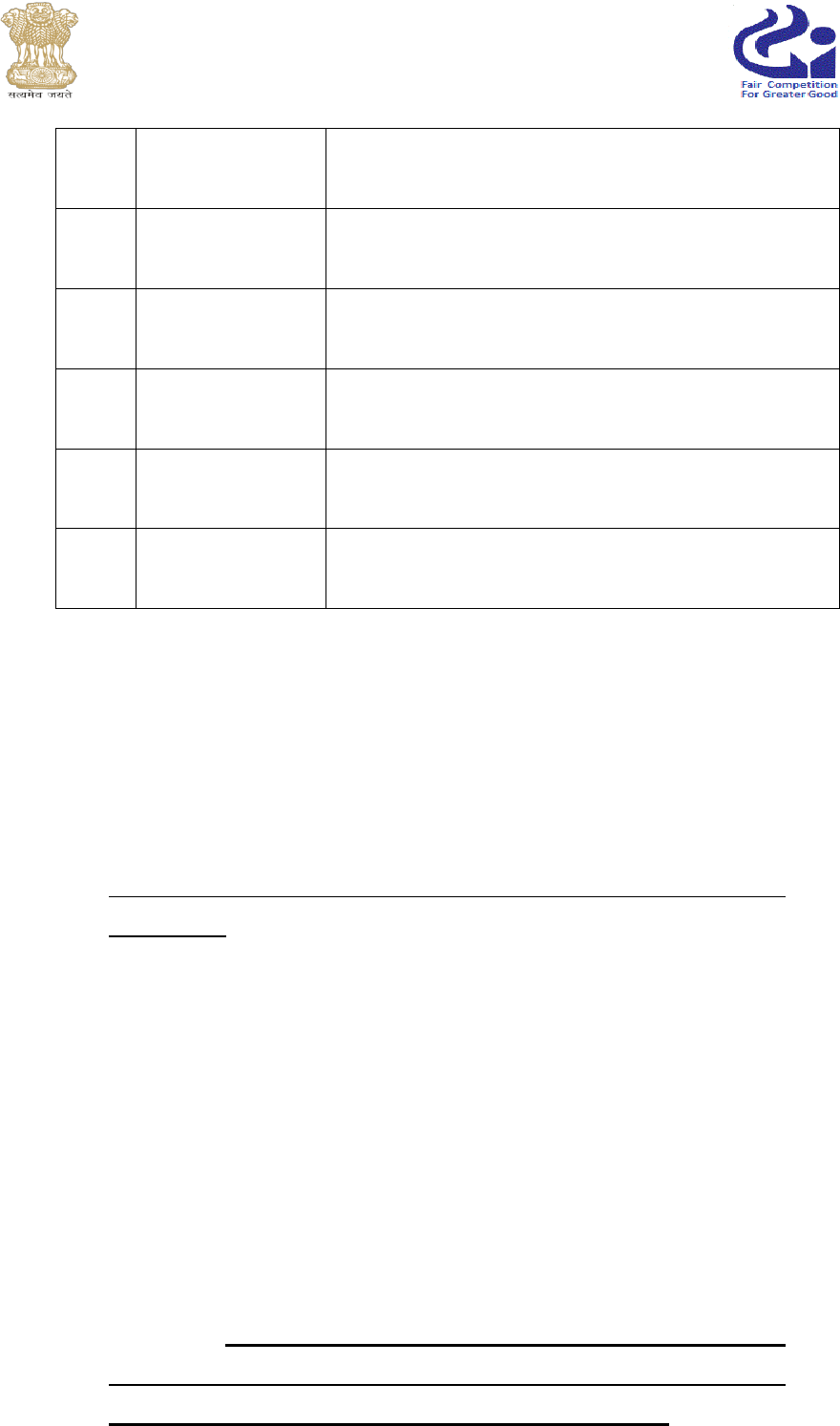
Ref. Case No. 02 of 2016 24
9.
04.08.2017
An e-mail between Mr. Jayant Kumar and Mr. Rakesh
Himatsingka
10.
05.08.2017
Two e-mails between Mr. Rakesh Himatsingka to Mr.
Jayant Kumar
11.
11.09.2017
An e-mail between Mr. Jayant Kumar and Mr. Rakesh
Himatsingka
12.
08.12.2017
An e-mail between Mr. Jayant Kumar and Mr. Rakesh
Himatsingka
13.
09.12.2017
An e-mail between Mr. Jayant Kumar and Mr. Rakesh
Himatsingka
14.
16.02.2018
An e-mail between Mr. Jayant Kumar and Mr. Rakesh
Himatsingka
57. The Commission further notes that an analysis of the above emails indicates that there
was an agreement between the OP-1 and OP-2 and this was communicated by the
Chairman of OP-2 to its employee Mr. Jayant Kumar for the price to be quoted in the
forthcoming tenders. The relevant excerpts of an e-mail dated 09.12.2017 exchanged
between Mr. Jayant Kumar and Mr. Rakesh Himatsingka is reproduced below:
Email dated 09.12.2017 from Mr. Jayant Kumar to Mr. Rakesh
Himatsingka
“Dear Sir,
Even if part qty from total qty shift in April' 18. We may approach the
concern railway for prepornment and may supply in March' 18 end to meet
forecast.
Otherwise if both the party quote single price of Rs.333/- which is close to
3.7% increase may not be any issue or may ask supporting to justify the
price, which we have documentary evident but may delayed the order
finalization. In my opinion for this tender we quote @ Rs321/- & M also
quote the same then, WR may finalize the LOT/Order fast as this rate is
already existing price. Next tender onward we quote Rs.333/-.
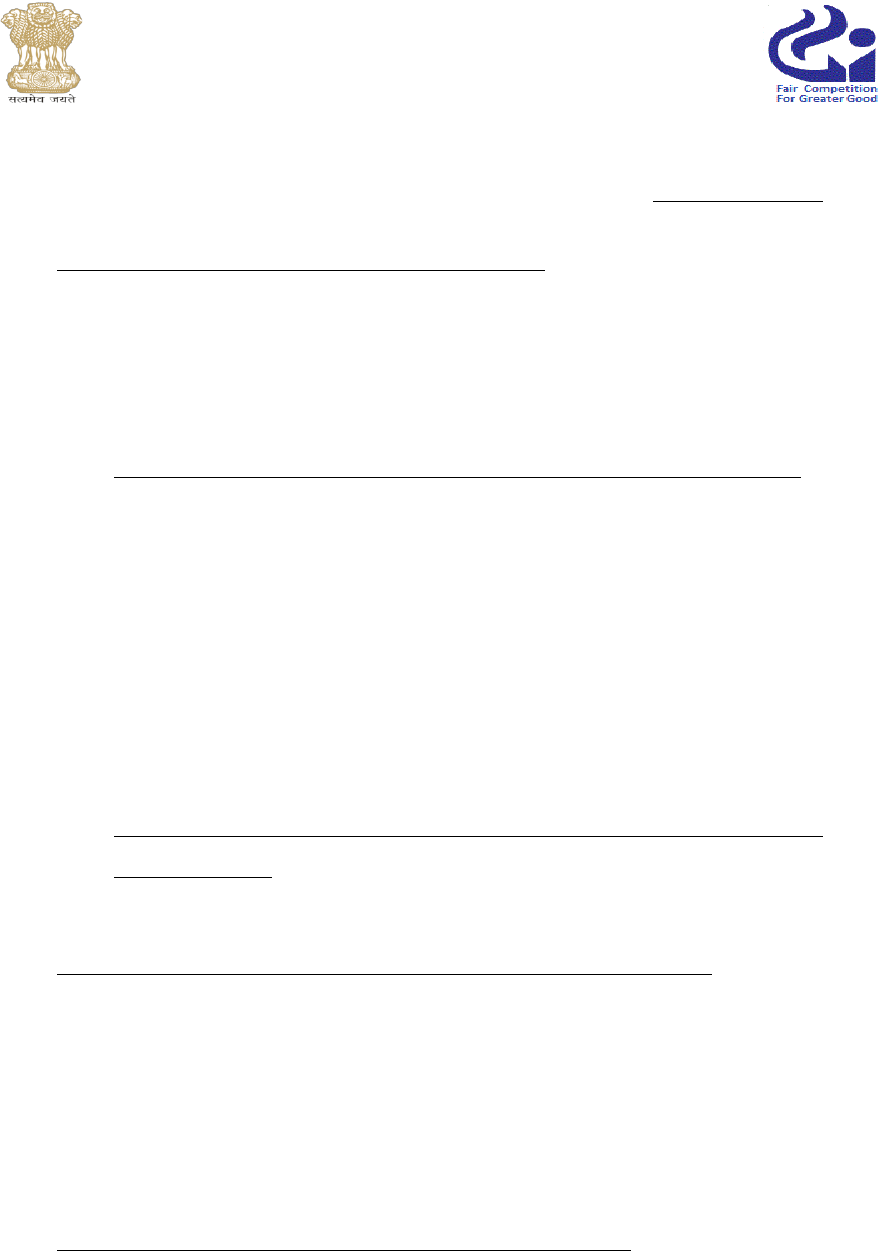
Ref. Case No. 02 of 2016 25
Seek your advice.”
(emphasis added)
Emails exchanged between the employees of OP-1
58. The Commission also notes that the DG has found an e-mail dated 01.09.2017 which
was exchanged between the employees of OP-1, regarding a meeting in Hyderabad to
discuss about the prices in the bids. The same is noted below:
Email dated 01.09.2017 from Mr. Sanjeev Kumar to Mr. Vijaya Kanthu
“Subject: SK-29081 7-DS-ASSAM CARBON-HYDERABAD WITH MR.
HEMANTH KUMAR Meeting with Mr. Jayanth Kumar of Assam Carbon-
Hyderabad-along with Mr. Hemanth Kumar Date of Meeting:
29.08.2017.”
Discussion
We have informed him to check the price with us when they are quoting
for a bid tender”
Statement of Mr. VallakalilIpe Perumal, Managing Director of OP-1
59. The Commission notes that Mr. VallakalilIpe Perumal, MD of OP-1, in his deposition
before the DG on 04.07.2019 admitted that his company discussed with its competitor,
i.e., OP-2 and decided the prices to be quoted in certain tenders floated by the Railways
so that both companies are able to share the quantity. Further, he also admitted that,
broadly, there was an informal agreement on prices to be quoted with OP-2.
Statement of Mr. Debashish Basak, General Manager, OP-1
60. Based on the statements of Mr. Basak, the Commission observes that he has also
confessed that his company, i.e., OP-1, had quoted the rates after discussions with OP-
2 in various Railway tenders since 2015. The relevant excerpt is reproduced below:
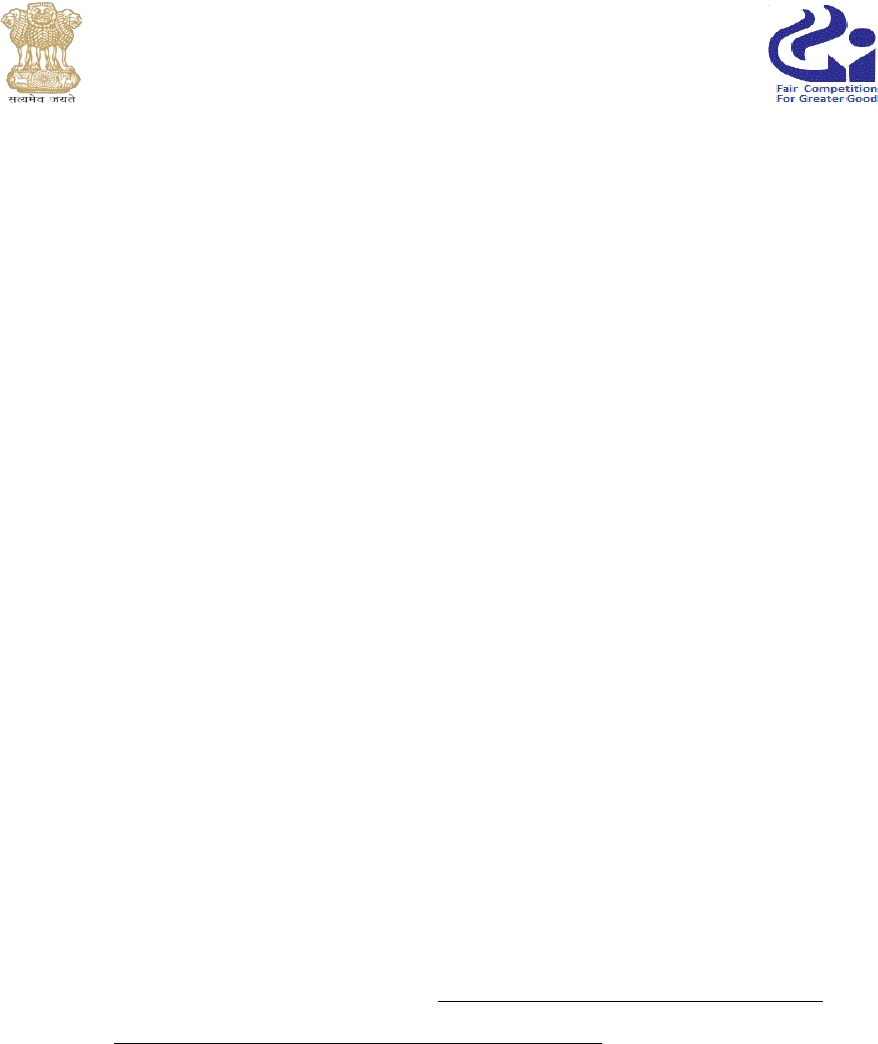
Ref. Case No. 02 of 2016 26
“I would also like to disclose that my company had quoted the price after
consulting with Assam Carbon in tender nos. 26141699-B opened on
07.07.2015, 26141699-C opened on 28.10.2015 and 26151699 opened on
16.04.2016.”
61. From the aforesaid statements, it has been clearly brought that there were exchanges
between the OPs regarding price discussion.
62. The Commission notes that the DG had also found evidence in the nature of e-mails
and messages, wherein the increase in price has been discussed and implemented by
the OPs. The relevant excerpt of message exchanged on 26.07.2019 between Mr. V. I.
Perumal, OP-1, and Mr Rakesh Himatsingka, OP-2, is reproduced below:
“Your giving current Prices, which are all of last tenders issued in the
previous financial year is very helpful. If you compare the prices that we
propose to quote as given by me in the last column you will see that excerpt
for item 7 being CB 64 where the proposed price of Rs 421 id 10.8 %
higher, otherwise it is between 4-6% only, and in fact for item no. 5 it is
lower and we need to increase it.
We know need to discuss what we quote individually for each item as you
mentioned about the other matter we need to take a call on who takes what
so that the other party quotes at least 5-6% higher.
I’m free to talk once you’ve gone through this and formed your
thoughts. Regards. RH”
…(emphasis added)
63. From the above, the Commission notes that OPs through concerted conduct increased
the prices of Hitachi Carbon Brushes. In the given market condition where there are
only two approved vendors for supply of the relevant product to the Railways, and if
they collude and quote an inflated price, the Railways has no option but to procure the
material at an inflated price and getting a competitive price is not possible. In the

Ref. Case No. 02 of 2016 27
present case, it is abundantly clear that OPs manipulated the tender in such a way
between themselves that it resulted in an increase in price as well as distribution of the
tenders between them as per collusive arrangement.
64. The Commission is of the view that WhatsApp chats, e-mails, communications and
the statements of individuals are direct evidence of the involvement of the Opposite
Parties, and nothing can be more incriminating than these. OP-1 and OP-2 had
discussed every detail of the tenders and the process to rig the bid. They had even
discussed how they would be compensated if they did not win the previous or earlier
tenders. Further, the Commission examined the statements given by the officials of
OP-1 on 04.07.2019. In the opinion of the Commission, such admissions are sufficient
to hold the Opposite Parties liable for contravention of the provisions of the Act.
65. In view of the above, taking into account all the aforesaid evidences collected by the
DG, the Commission concludes that OP-1 and OP-2 had indulged in cartelization in
the Hitachi Carbon Brushes market in India, at least from November 2014 till 2019,
by means of co-ordinating bid response and manipulating the bidding process, which
had an AAEC within India. The exchange of communication is direct evidence
displaying the anti-competitive conduct of the OPs and sufficient to hold that OPs have
contravened the provisions of Section 3(3)(d) of the Act. The Commission therefore,
finds OP-1 and OP-2 to be in contravention of the provisions of Section 3(3)(d) read
with Section 3(1) of the Act.
66. At this stage, it would be appropriate to consider the contention of the OPs that there
was no Appreciable Adverse Effect on Competition (AAEC) in the market for Hitachi
Carbon Brushes in India; and the Indian Railways, being a monopolistic buyer,
unilaterally defines and controls the market through its procurement policies and
procedures, and thus, the OPs do not have any control or say in the process.
67. In this regard, the Commission notes that the pleas are misdirected. Suffice to observe
that from a bare reading of the provisions of Section 3 (1) of the Act, it is evident that
these provisions not only proscribe the agreements which cause AAEC but the same
also forbid the agreements which are likely to cause AAEC. Hence, the plea that there
is no contravention of the provisions of the Act in the present matter because allegedly

Ref. Case No. 02 of 2016 28
no AAEC has been caused as a result of the alleged cartel between the parties, is
misdirected and untenable in the face of clear legislative intent whereby even the
conduct which can potentially cause AAEC, is prohibited. Furthermore, once an
agreement of the types specified under Section 3(3) of the Act is established, the same
is presumed to have an AAEC within India. Therefore, it follows that once an
‘agreement’ of the types as specified in Section 3(3) of the Act, is shown to be
established, the same falls within the presumptive rule of AAEC as provided
thereunder. The parties, however, can rebut such statutory presumption in light of the
factors provided under Section 19(3) of the Act.
68. Further, the parties have failed to show as to how their impugned conduct resulted into
any accrual of benefits to consumers; improvements in production or distribution of
goods or provision of services; or promotion of technical, scientific and economic
development by means of production or distribution of goods or provision of services,
in terms of Section 19(3) of the Act. On a holistic evaluation of the replies filed by the
parties in light of the factors enumerated in Section 19(3) of the Act, the Commission
is satisfied that the parties have not been able to dislodge the statutory presumption by
adducing cogent evidence, as required.
69. Once contravention by the Opposite Parties, which are companies, is established, the
Commission now proceeds to analyse the conduct of the Opposite Parties’ directors,
officers, and employees who would be liable for such anti-competitive acts of the
Opposite Parties in terms of Section 48 of the Act. As per the investigation report, the
following persons; (i) Mr. V. I. Perumal, Managing Director of OP-1, and Mr. Rakesh
Himatsingka, Director of OP-2, have been found to be liable under Section 48(1) and
48(2) of the Act by the DG.
70. Before the Commission, neither of the above individuals have been able to prove that
the contravention committed by their respective companies was without their
knowledge or that they had exercised all due diligence to prevent the commission of
such contravention. The Commission notes that Mr. V. I. Perumal and Mr. Rakesh
Himatsingka were actively communicating through multiple modes of communication
as noted in this order.
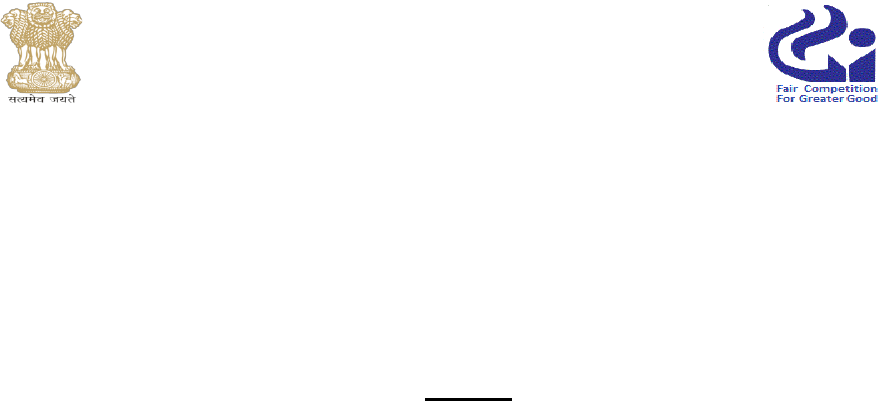
Ref. Case No. 02 of 2016 29
71. None of the above individuals has been able to rebut or deny before the Commission
the specific roles played by them in the cartel for which the DG has gathered cogent
evidences. Therefore, the Commission finds the aforesaid individuals of OP-1 and OP-
2 liable in terms of the provisions of Section 48(1) as well as Section 48(2) of the Act.
ORDER
72. In view of the above analysis, the Commission holds OP-1 and OP-2 to have
contravened the provisions of Section 3(1) of the Act read with Section 3(3)(d) thereof
during the period from November 2014 to 2019, as detailed in this order.
73. Further, the Commission, in terms of Section 27(a) of the Act, directs OP-1 and OP-2
and their respective officials who have been held liable in terms of the provisions of
Section 48 of the Act, to cease and desist in the future from indulging in practices
which have been found in the present order to be in contravention of the provisions of
the Act.
74. The Commission has bestowed its thoughtful consideration on the issue of imposition
of penalty upon the OPs and respective officials keeping in view the market structure,
nature of the firms, their relevant revenues & profits from supply of carbon brushes. In
this regard, the Commission notes that both the OPs are medium enterprises and from
the financials provided by the OPs, it appears that OP-2 was incurring losses from sale
of carbon brushes during the financial years 2014-15 to 2018-19. OP-1 also appears to
have suffered losses from supply of carbon brushes during some of the years. The
Commission is also not oblivious to the fact that both the OPs have filed lesser penalty
application and have acknowledged their conduct. The Commission is also conscious
of the fact that the MSME sector in India is already under stress and bearing the impact
of the economic situation arising from the outbreak of the pandemic (COVID-19). The
Government of India has undertaken various measures to support the liquidity and
credit needs of viable MSMEs to help them withstand the impact of economic shock.
In such a situation, if any penalty were to be imposed on these firms, it may render
these firms economically unviable and may even result in exit from the market, which
would further reduce competition in a market already characterised by the presence of
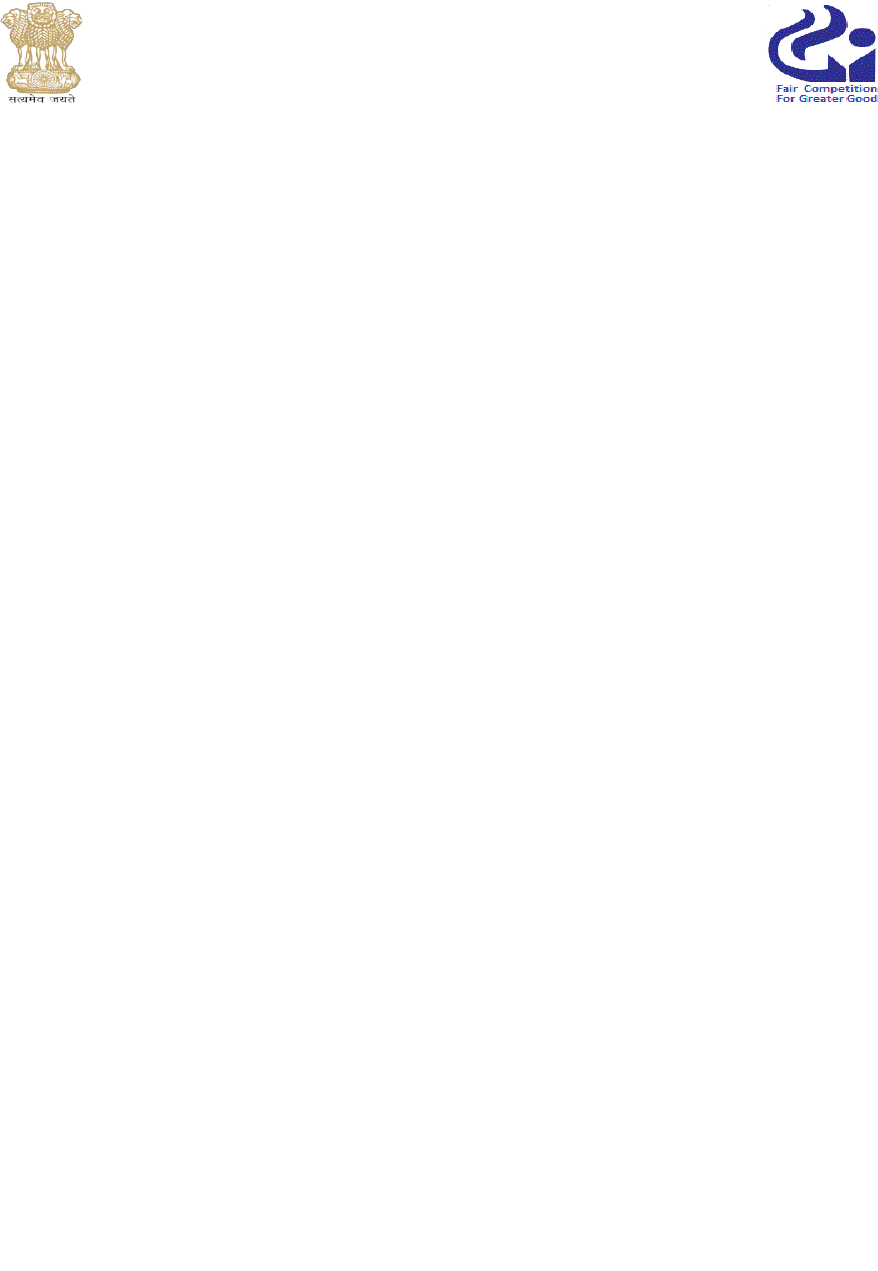
Ref. Case No. 02 of 2016 30
few players due to the policy of the Indian Railways to procure items from RDSO-
approved vendors. Thus, considering the matter holistically, the Commission decides
not to impose any monetary penalty on the OPs and their respective officials. Further,
the Commission is of the considered opinion that the objectives of the Act would be
met if the parties in the present matter cease such cartel behaviour and desist from
indulging in similar behaviour in the future, as directed earlier.
75. The parties are, however, cautioned to ensure that their future conduct is strictly in
accord with the provisions of the Act, failing which, any such future behaviour would
be viewed seriously as constituting recidivism, with attendant consequences.
76. It is made clear that nothing contained in this order shall be deemed confidential, as
the same has been used in the terms of provisions of Section 57 of the Act
77. The Secretary is directed to communicate with the Parties accordingly.
Sd/-
(Ashok Kumar Gupta)
Chairperson
Sd/-
(Sangeeta Verma)
Member
Sd/-
(Bhagwant Singh Bishnoi)
Member
Date: 01/11/2021
Place: New Delhi
